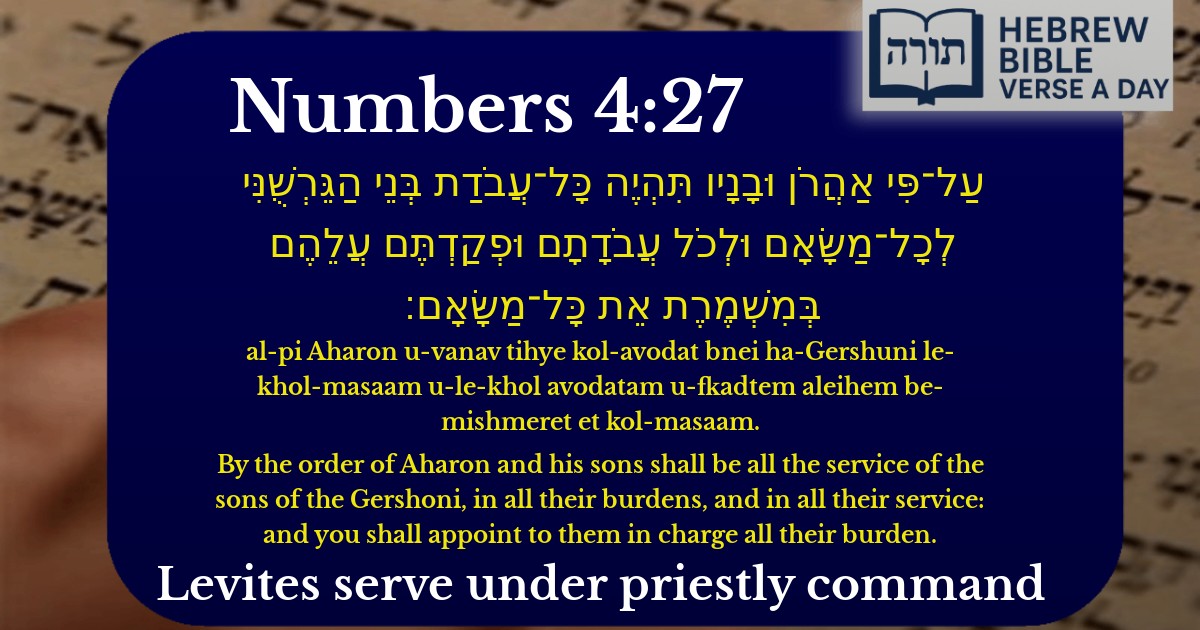Join Our Newsletter To Be Informed When New Videos Are Posted
Join the thousands of fellow Studends who rely on our videos to learn how to read the bible in Hebrew for free!
Hebrew Text
עַל־פִּי אַהֲרֹן וּבָנָיו תִּהְיֶה כָּל־עֲבֹדַת בְּנֵי הַגֵּרְשֻׁנִּי לְכָל־מַשָּׂאָם וּלְכֹל עֲבֹדָתָם וּפְקַדְתֶּם עֲלֵהֶם בְּמִשְׁמֶרֶת אֵת כָּל־מַשָּׂאָם׃
English Translation
By the order of Aharon and his sons shall be all the service of the sons of the Gershoni, in all their burdens, and in all their service: and you shall appoint to them in charge all their burden.
Transliteration
Al-pi Aharon u-vanav tihye kol-avodat bnei ha-Gershuni le-khol-masaam u-le-khol avodatam u-fkadtem aleihem be-mishmeret et kol-masaam.
Hebrew Leining Text
עַל־פִּי֩ אַהֲרֹ֨ן וּבָנָ֜יו תִּהְיֶ֗ה כׇּל־עֲבֹדַת֙ בְּנֵ֣י הַגֵּרְשֻׁנִּ֔י לְכׇ֨ל־מַשָּׂאָ֔ם וּלְכֹ֖ל עֲבֹדָתָ֑ם וּפְקַדְתֶּ֤ם עֲלֵהֶם֙ בְּמִשְׁמֶ֔רֶת אֵ֖ת כׇּל־מַשָּׂאָֽם׃
עַל־פִּי֩ אַהֲרֹ֨ן וּבָנָ֜יו תִּהְיֶ֗ה כׇּל־עֲבֹדַת֙ בְּנֵ֣י הַגֵּרְשֻׁנִּ֔י לְכׇ֨ל־מַשָּׂאָ֔ם וּלְכֹ֖ל עֲבֹדָתָ֑ם וּפְקַדְתֶּ֤ם עֲלֵהֶם֙ בְּמִשְׁמֶ֔רֶת אֵ֖ת כׇּל־מַשָּׂאָֽם׃
🎵 Listen to leining
Parasha Commentary
📚 Talmud Citations
This verse is not quoted in the Talmud.


Overview of the Verse
The verse (Bamidbar 4:27) describes the responsibilities of the Gershonite Levites in transporting the Mishkan (Tabernacle) under the supervision of Aharon and his sons, the Kohanim. Their duties included carrying specific parts of the Mishkan, and their work was to be meticulously overseen.
Rashi's Commentary
Rashi explains that the phrase "עַל־פִּי אַהֲרֹן וּבָנָיו" ("by the order of Aharon and his sons") means that the Gershonites were not permitted to perform their tasks independently. Rather, they acted only upon direct instruction from the Kohanim, who were responsible for ensuring that each item was transported properly. This emphasizes the hierarchical structure of the Mishkan's service.
Rambam's Perspective
In Hilchos Klei HaMikdash (Laws of the Temple Vessels), Rambam elaborates on the division of labor among the Levites. The Gershonites were entrusted with carrying the curtains and coverings of the Mishkan (as detailed in Bamidbar 4:25-26), but their work required supervision to prevent errors in handling sacred objects.
Midrashic Insights
The Midrash Tanchuma (Bamidbar 6) highlights the importance of following precise instructions in divine service. The Gershonites, though Levites, were subordinate to the Kohanim, teaching that even those engaged in holy work must submit to proper authority to maintain the sanctity of their tasks.
Key Lessons from the Verse